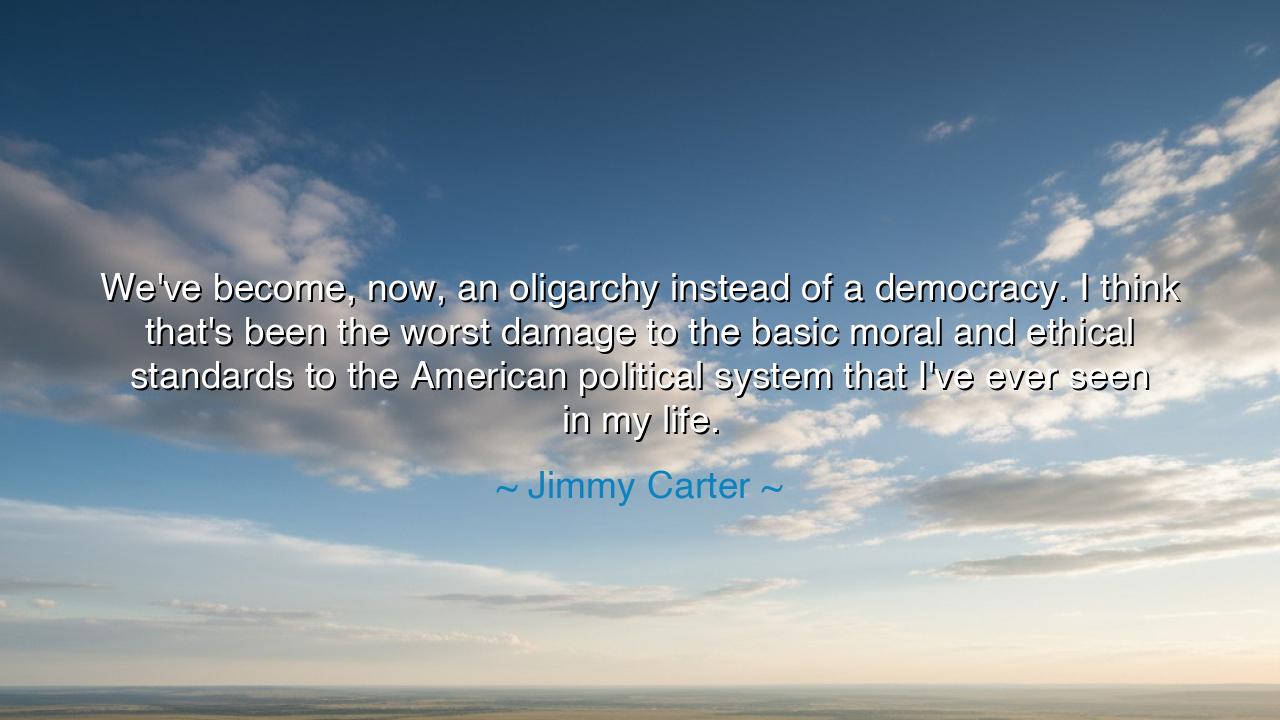
We've become, now, an oligarchy instead of a democracy. I think
We've become, now, an oligarchy instead of a democracy. I think that's been the worst damage to the basic moral and ethical standards to the American political system that I've ever seen in my life.






The words of Jimmy Carter—“We've become, now, an oligarchy instead of a democracy. I think that's been the worst damage to the basic moral and ethical standards to the American political system that I've ever seen in my life.”—fall like a lament and a warning from one who once bore the burdens of the presidency. They are not the idle complaints of a bitter man, but the sorrowful witness of one who gave his years in service to the people and has lived long enough to see the shifting of power from the hands of the many to the grasp of the few. In his voice resounds the cry of a statesman who remembers the dream of democracy, only to see it distorted into the shadow of oligarchy.
The origin of this statement lies in Carter’s reflections during his later years, when he spoke openly about the corrupting influence of money and concentrated power in American politics. He observed how the will of ordinary citizens was increasingly drowned out by the wealth of corporations, special interests, and elites. To him, this was not simply a political failure but a betrayal of the moral and ethical standards upon which the republic was built. For if democracy means the rule of the people, then oligarchy—the rule of the few—marks its decline.
History offers us many examples of this tragic transformation. In the ancient city of Athens, birthplace of democracy, the promise of popular government gave way at times to the dominance of wealthy aristocrats. What began as the bold experiment of free citizens debating in the assembly was often subverted by the power of money and the influence of the few. Likewise, in the Roman Republic, the early ideals of shared governance crumbled into the control of patrician elites and, eventually, the tyranny of emperors. Carter’s warning places America in this same story: that without vigilance, the dream of liberty is always at risk of being devoured by greed.
The weight of Carter’s words lies not only in the diagnosis of political decay, but in the recognition of its spiritual cost. He calls it the “worst damage” he has seen, for corruption of institutions is not merely legal—it corrodes the very soul of a nation. When the people lose trust that their voice matters, when the poor and powerless are silenced by wealth and privilege, the covenant of democracy is broken. A society without faith in its fairness cannot endure; its citizens grow cynical, divided, and resentful, and the flame of hope begins to wither.
And yet, Carter’s lament is not meant to end in despair. By naming the problem, he calls us to courage. For the ancients taught that decline is not inevitable if men and women remember their duty. Just as the Athenians reclaimed their assembly in times of crisis, and just as reformers across history have fought to return power to the people, so too can Americans rise again. The warning of oligarchy can be the seed of renewal—if the people refuse complacency and demand justice.
The lesson for us is clear: democracy is fragile, and it demands the vigilance of every generation. We cannot hand it over to the powerful and hope it will survive. Each citizen must act—by voting, by speaking, by holding leaders accountable, by refusing to be seduced by apathy. True democracy is not preserved by institutions alone, but by the living spirit of a people who value fairness above wealth and community above privilege.
Practically, this means rejecting the influence of money in politics where we can, supporting reforms that strengthen transparency, and lifting our voices to demand that government serve the many and not the few. It means teaching future generations not only the mechanics of democracy, but its sacred meaning: that every voice has worth, that justice belongs to all, and that freedom dies when only the rich rule.
Thus, Carter’s words endure as both warning and torch. If democracy has become oligarchy, it is not the end, but a summons to rise. Let us not forget the moral and ethical foundation upon which the nation was built. Let us remember that the power of the people, once awakened, has overturned tyrants and rebuilt nations. And let us carry forward the ancient truth that freedom, though fragile, is the noblest inheritance of all—and it must be guarded with both courage and sacrifice.






AAdministratorAdministrator
Welcome, honored guests. Please leave a comment, we will respond soon